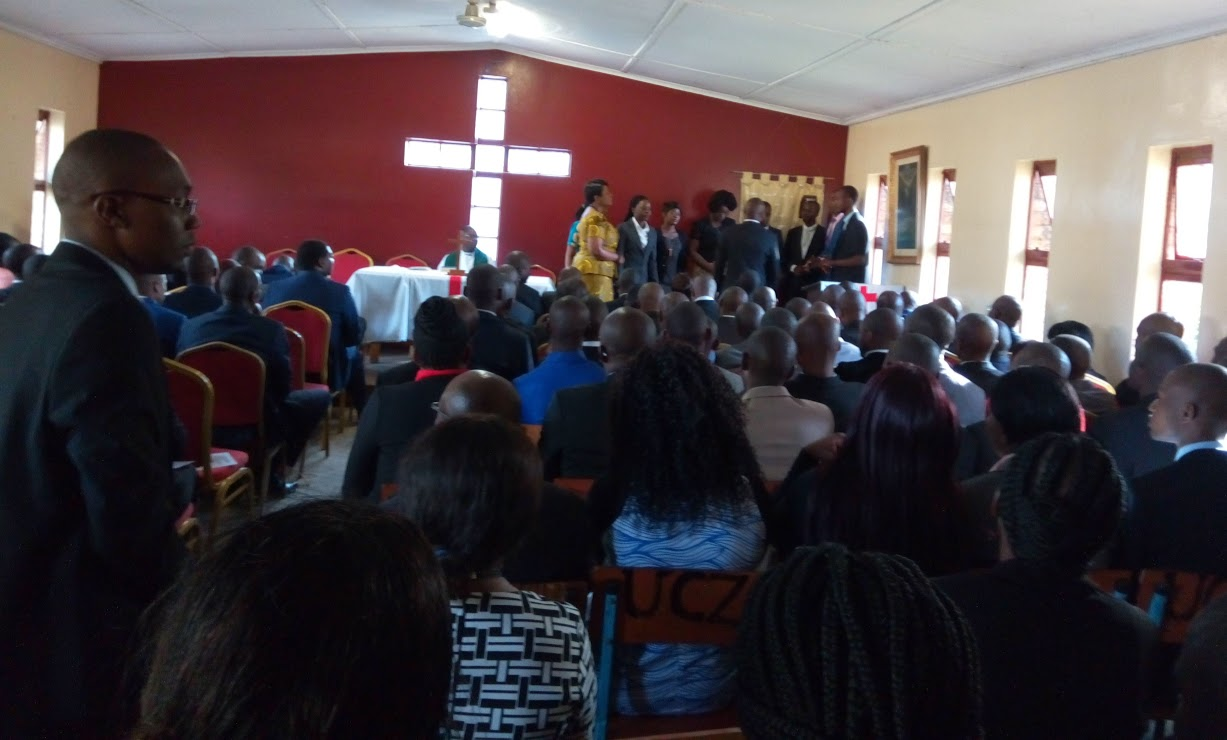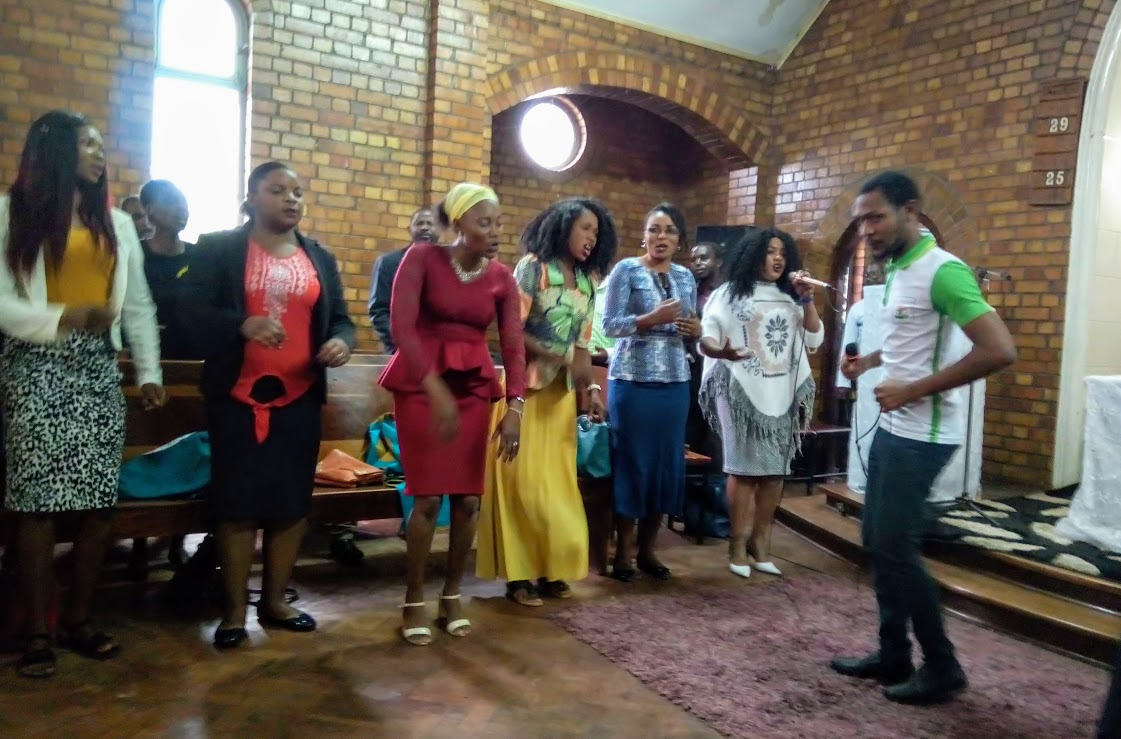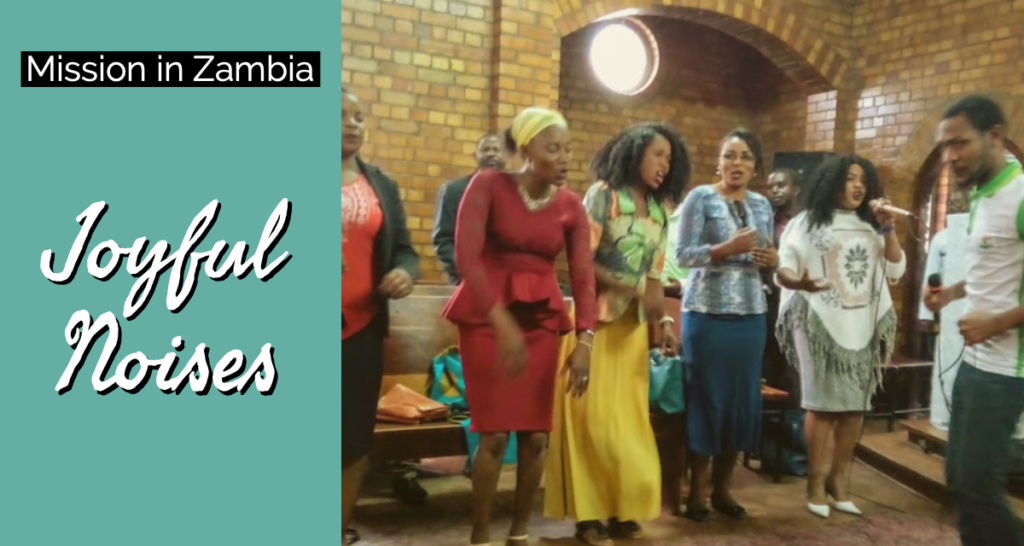Joyful Noises in Zambia
One of the aspects of Zambian worship, which has most struck me during my term of volunteer service here, has been the very rich musical life of the United Church of Zambia (UCZ).
 As a lecturer at the UCZ University theology department, I have had occasion to witness some amazing moments in worship here. I have always loved music of all sorts but I have definitely had my perspective broadened and deepened here. Let me share a few moments with you.
As a lecturer at the UCZ University theology department, I have had occasion to witness some amazing moments in worship here. I have always loved music of all sorts but I have definitely had my perspective broadened and deepened here. Let me share a few moments with you.
First of all, we have university chapel every weekday morning. It is compulsory on Monday mornings, but all are welcome the other four mornings of the week. Every chair is filled, whether by theology students (at 6:30 a.m.!) or students and teachers from other college departments. A different ministerial student preaches a short meditation every morning, but there is also very rich singing from the students in attendance. As they await the arrival of the occasional lecturer or the appointed starting time, the students self-select the songs they want to sing. Most, of course, are in the Bemba language – that’s the dominant language in north central Zambia – but they try to include one or two traditional English hymns at almost every chapel service. On certain other days, there is an attempt to include minority tribes’ languages in the community’s cycle. For example, the Lozi language may used on, say, Tuesday, or Nyanja or Tonga on another morning. All of this is, of course, accompanied with vigorous drumming by at least three students creating remarkably complex rhythms … and one tambourine and lots of hand-clapping. A few (sometimes more!) may get up and dance. After chapel, everyone is definitely awake and ready for the day.
Second, the university sits in a large parcel of land owned by the Mindolo Ecumenical Foundation (MEF). MEF offer courses in peacemaking, video skills, journalism and more, and there is also a morning chapel meeting every weekday. I have attended that chapel at times and, as I have at our UCZU chapel, been honored to be invited to preach the morning message on certain occasions. In this chapel also there is a living tradition of congregational singing. The MEF chaplain is a United Methodist and he leads all services. The singing there is almost always in English but no less enthusiastic. There will be three or four hymns sung, punctuated with a prayer or two, the short sermon, and then another hymn and a benediction. Music is always an important focus in that chapel also. Once a month, usually the first Friday, the MEF chapel and the UCZU chapel hold a joint service.
 I want to mention two other aspects of music in worship in my experience with the United Church of Zambia. On occasions of great celebration, such as Easter or Women’s Day or such, the services can be hours long. Communion services will always be three or four hours long … at least. It is my experience that at least the first hour, maybe two hours, will be given over to choral and congregational singing. Even at the English service at the big Mindolo UCZ Congregation (maybe 4,000 persons in attendance each Sunday), most of the singing will be in Bemba. Last Easter, however, I heard one visiting choir sing an anthem in English that arrestingly beautiful and very cleanly sung. Other churches send choirs to one congregation or another and they take turns – usually singing two or three numbers each – some acapella, some with the support of electronic keyboards and loudspeakers (I have never seen or heard a church organ since I have been here). Then, the next choir will stand and deliver. This regularly goes on for up to half of the worship service. And, there is always more music sung during the offertory and at the conclusion of worship.
I want to mention two other aspects of music in worship in my experience with the United Church of Zambia. On occasions of great celebration, such as Easter or Women’s Day or such, the services can be hours long. Communion services will always be three or four hours long … at least. It is my experience that at least the first hour, maybe two hours, will be given over to choral and congregational singing. Even at the English service at the big Mindolo UCZ Congregation (maybe 4,000 persons in attendance each Sunday), most of the singing will be in Bemba. Last Easter, however, I heard one visiting choir sing an anthem in English that arrestingly beautiful and very cleanly sung. Other churches send choirs to one congregation or another and they take turns – usually singing two or three numbers each – some acapella, some with the support of electronic keyboards and loudspeakers (I have never seen or heard a church organ since I have been here). Then, the next choir will stand and deliver. This regularly goes on for up to half of the worship service. And, there is always more music sung during the offertory and at the conclusion of worship.
Secondly, it impacts me greatly to watch these singers, these choirs, joyfully putting out their praise of God in the loudest voices they possess using words they have committed to memory. I do not believe I have ever seen any choir using a hymnal or printed material here. These singers know the words and they sing like they know the deep spiritual meaning of the words. The congregation is always joining in, some dancing in the aisles or sashaying up to the choir director or the soloists to give them encouragement for their musical offering. I have seen elders of the church dance all around the sanctuary, orchestrating movement from others in the congregation. Music is clearly a mode of worship here that is profoundly resonant with Zambian Christians.
I am anxious to see and hear what happy musical moments await me in this coming holy season. I wish you all a blessed and musical Easter.
Robert Breckenridge serves with the United Church of Zambia. His appointment is made possible by your gifts to Disciples Mission Fund, Our Church’s Wider Mission, WOC, OGHS, and your special gifts.

